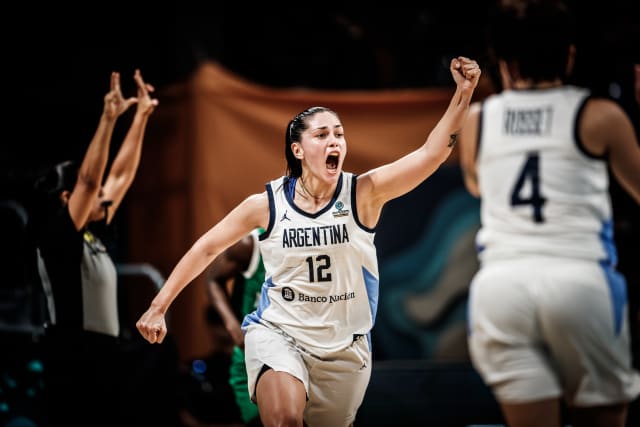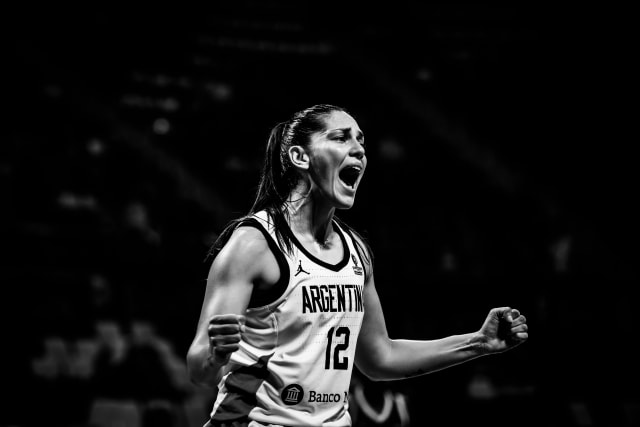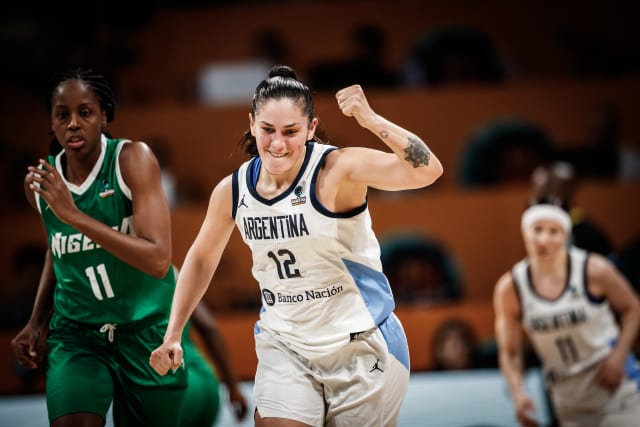Ornella Santana: The Spirit of Las Gigantes
“Sacrifice. Dedication. Pride of belonging.” This is the motto that proclaims a video that promotes the Argentine women's national basketball team’s participation in the FIBA Women’s Olympic Pre-Qualifying
“Sacrifice. Dedication. Pride of belonging.” This is the motto that proclaims a video that promotes the Argentine women's national basketball team’s participation in the FIBA Women’s Olympic Pre-Qualifying Tournament. This phrase perfectly identifies Ornella Santana with her national team. The 29-year-old power forward has been playing in the senior national team for almost a decade. “In 2010 they called me for the shortlist, but I wasn’t picked. There was a very good squad and the younger players knew that it was impossible to be in that team. In 2011 there was an important generational rebuilding: many players stopped participating due to other personal matters, such as work or school, and many of the team that had won the bronze in the U19 World Cup 2009 in Thailand came to the team.” Of that team that achieved the third place, there are five players that are on the current squad: Ornella Santana, Débora González, Agostina Burani, Natacha Pérez, and Andrea Boquete. Also, Macarena Rosset, who couldn't be in that tournament due to an injury, is part of the same generation. “Being here today with so many teammates from that World Cup is incredible. There's a lot of confidence in us and we know each other a lot,” Santana shared.

After the initial call to the national team, Santana understood the effort required to compete at an international level: “Between 2011 and 2012 I gained a lot of weight and got to 219 pounds. That's where the nickname “Gordi” came from and it stayed forever. I wasn’t realizing how I was, physically, until Roberto Santín, the national team trainer at the time, told me that I needed to improve my physical condition. That was a turning point because I wanted to be in the national team. A nutritionist from Obras designed a diet for me and in a year, I was able to lose 53 pounds. Now, the entire national team follows Luciano Spena’s suggestions. He’s an excellent nutritionist that helps us a lot. To be able to play basketball at this level, with the current rhythm, it's impossible to play if you're not physically well. The best example in that sense is Carolina Sánchez, who played 19 years in the national team and today continues to be active at the age of 49.
Ornella’s relationship with basketball began, of course, long before those first calls to the national team. She shares how she remembers it: “I started at the age of 8 in Ciudadela Norte, tagging along with my brother, who wanted to try the sport out. My family already went to that club since forever. My mom, my dad, and my grandfather had played basketball there. After a year and a half, I had to stop going because the women’s categories stopped existing. But I told my mom that I liked it and that I wanted to keep playing, so they took me to Vélez. There I faced tougher training sessions and I liked it more and more each day. At first, I didn't really like it, but when I turned 12, I grew a lot and started to play more. They called me for the Capital team and then, at the age of 15, to the Argentine team.”

Santana quickly realized that she wanted basketball to be her way of life: “When I was young, I realized that if a game conflicted with other activities like, for example, my best friend’s birthday, I chose to play the game. The same thing when I preferred traveling with the team instead of going to some family event. So, when I left aside other important things in my life, I realized that I wanted to give it all to this sport.” But, of course, being a player in Argentina is no easy task: “It's quite hard and even more so for players that don't have the chance to play in another country. It's complicated in Argentina because few players make earn money. That's where the extra effort comes in and the fact of playing with passion and for the love of the game. Those of us who play overseas are better off because we have another quality of life. We spend less money because they pay for our apartment and everything related to housing, so we can administer money better.”
Ornella has been playing for three years in Spain. She talks about her arrival at the Old Continent: “I would've liked to arrive in Europe at a younger age. Because I don’t have the (European) passport, and because I'm a power forward that's not very tall (5’9”) it was difficult to find my place. In 2017 a Spanish coach, Aday Villalba, wrote to me and offered me a spot to play in Lanzarote. That’s what I wanted. It was a very big door and although I didn't know how it would go, I took my chances and went. I had no idea where the city was and how the team was, but I took on the adventure. Once I signed the contract, I looked it up on the internet and then I knew I was going to an island. I arrived and found a very beautiful place and with incredible people. That first year was very good for me. In the second year, I went to Almería, which was a more complete team and where I could compete more. That’s where I found teammates that I already knew, like Macarena D’Urso and Isabel Latorre Alcántara”. Santana herself explains how she could win opportunities in Spanish basketball: “The virtues of my game aren’t reflected so much in the statistics, but in Spain, they value that spirit and that something else that we Argentines have. I give my teammates and coaches confidence. I give everything on the defense, and I know how to play the role I was meant to play. I inject them with good energy. I'm at my team’s service and I'm someone that goes forward no matter what's going on.”

In Spain, Santana not only found a place to develop professionally at a high level. She also found love. “I saw Isa for the first time when we played against each other in the second or third quarter of my first season in Spain. We met after the game, we went out to party,” Ornella remembers. “After that day we kept talking more and more until we started being together. Later, she came with me to Argentina, but she only spent ten days because she had to return to Spain due to a serious family problem,” she says emotionally.
After her successful first season in Lanzarote, she was called by Almería, where she shared the team with her partner in the last two seasons. “Living with Isa helps me to be well both in and out of the court, although we know how to separate the fact of being teammates and being partners. Because I'm a bit bigger than she is, I try to help her to control her strong character. She gets mad really fast in the court, and because I know her, I know how to get to her to calm her down,” Santana explains. Not only is the power forward in Europe, but also her future: “I love living in Almería and since the first time I went back to Argentina I told my mom and my dad that in the future I'm staying in Spain. The problem is that for my mom it's difficult to visit me because she’s really scared of the plane. It would be a dream for me that my family is able to go there with me.” Santana already has some plans for when she stops playing professionally: “I want to build a project related to beauty to have my own place and continue my relationship with basketball. Although I know that I’ll follow that path, I still don’t have that on my mind.” Meanwhile, in her aesthetic and personal look, Ornella has a pair of tattoos on her left arm. She explains: “One is a mandala flower because I like these designs very much. The other one is a heart that I did with one of my sisters and it represents the unity I have with my family. Now I must convince my little sisters to get one too so that the four of us have it.”
While she dreams of the European life for her entire family, Santana has her feet on the present ground and knows what women's basketball needs to develop more and better players: “More budget and publicity. We give a lot, we train hard. We make the same effort as the men's teams, but we don’t receive the same rewards. For women's basketball to grow in Argentina all players must be considered as professionals to be able to develop. All players, even those that don’t make money, have the same commitment as those that do receive a salary. There are many female players that abandon the game because they can’t sustain their athletic careers while studying or working.”
That's Ornella Santana. She lives and plays with sacrifice, dedication, and pride of belonging.
Pablo Cormick
FIBA